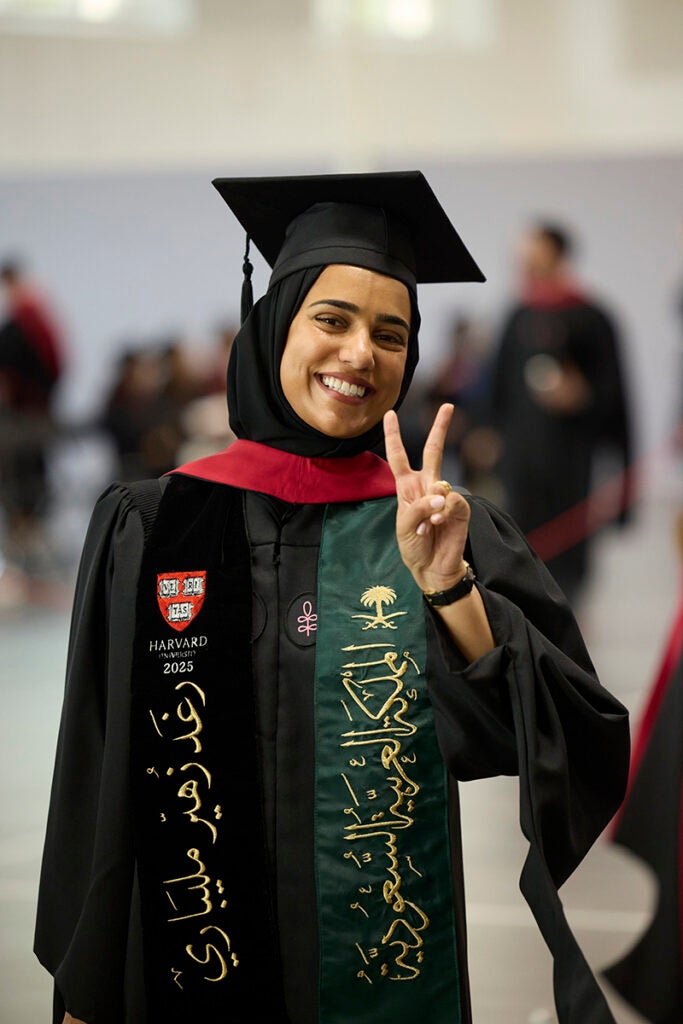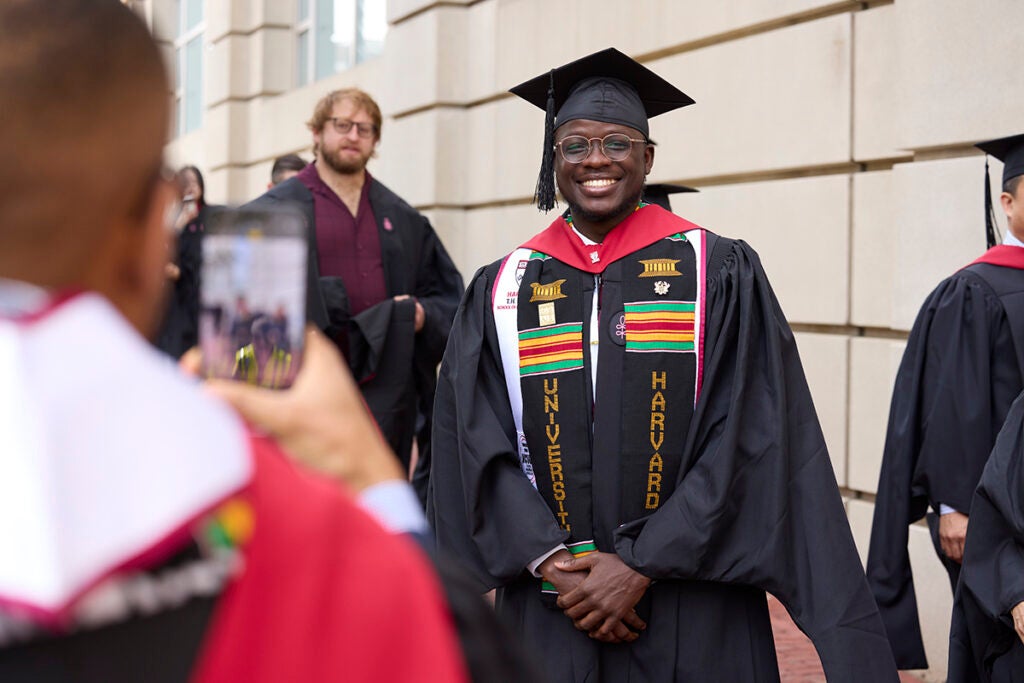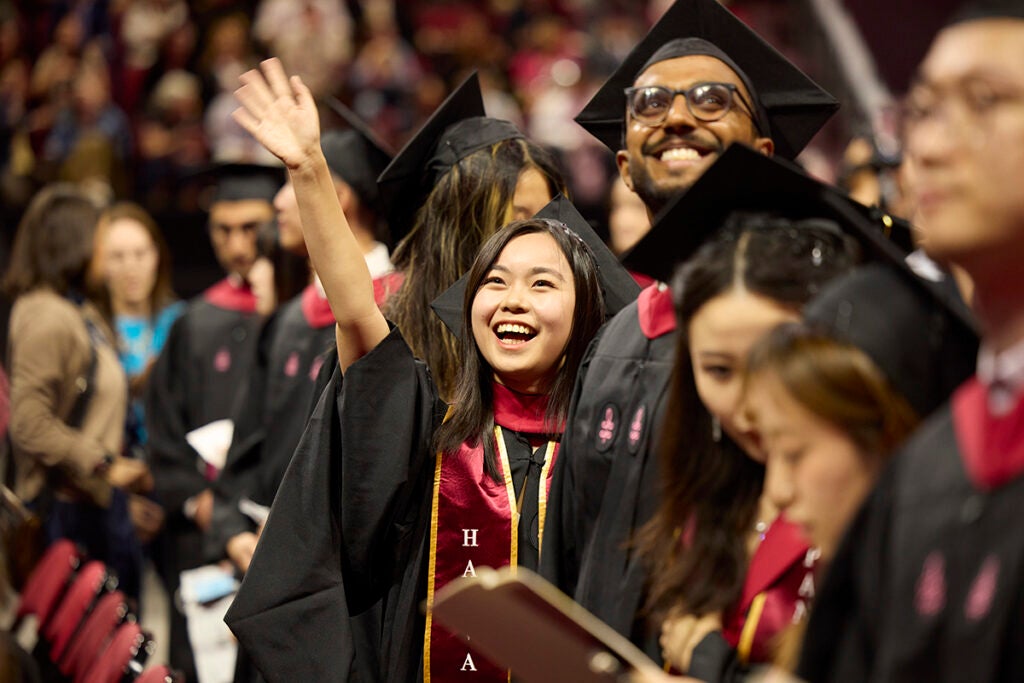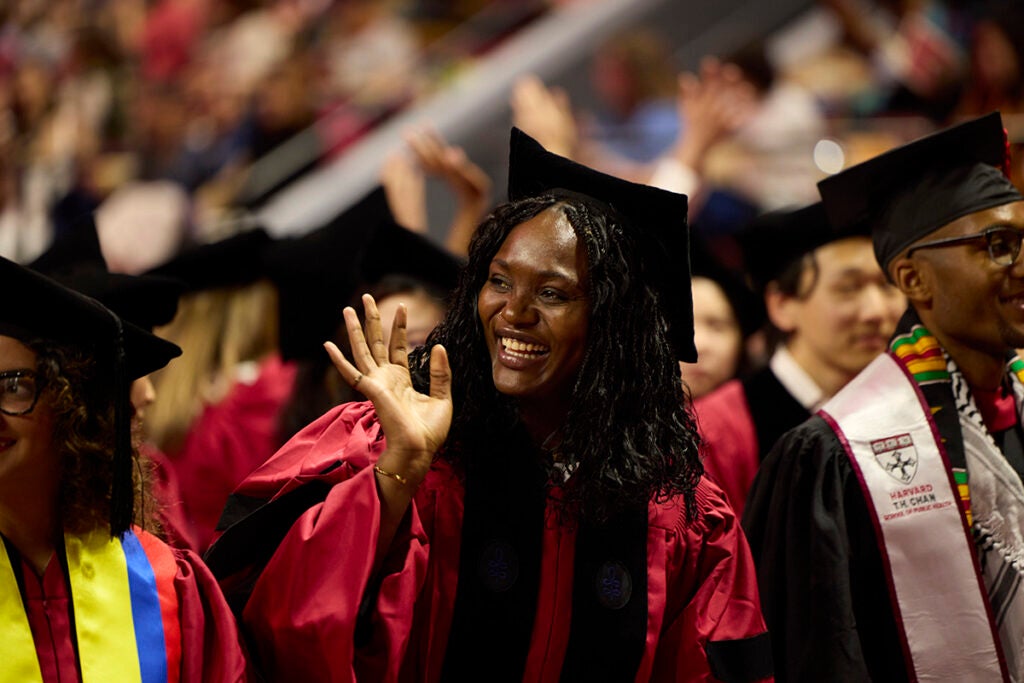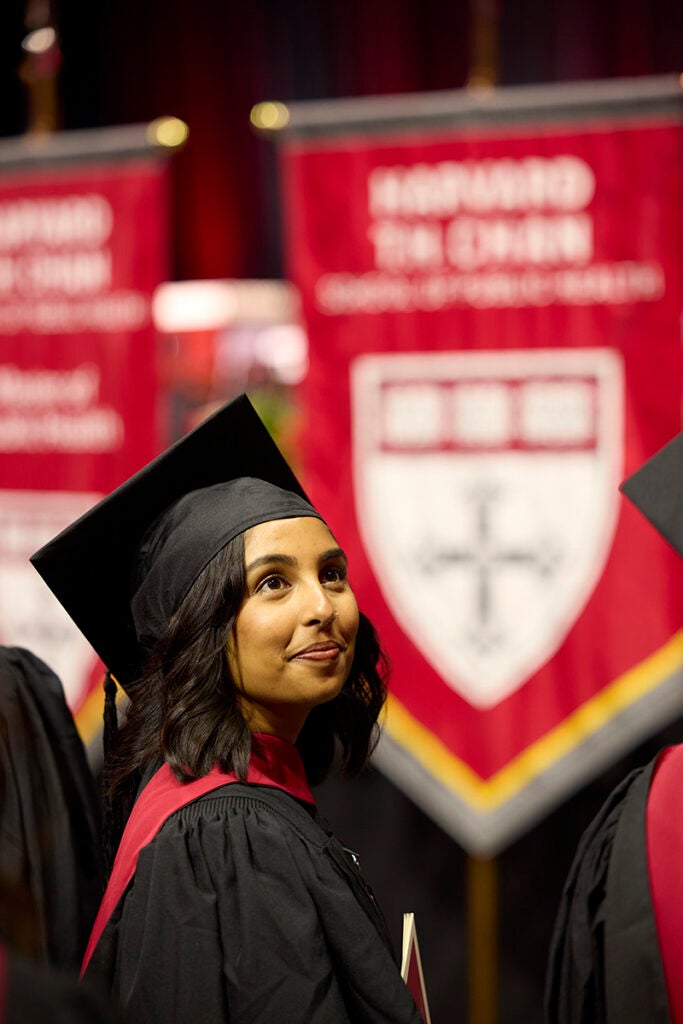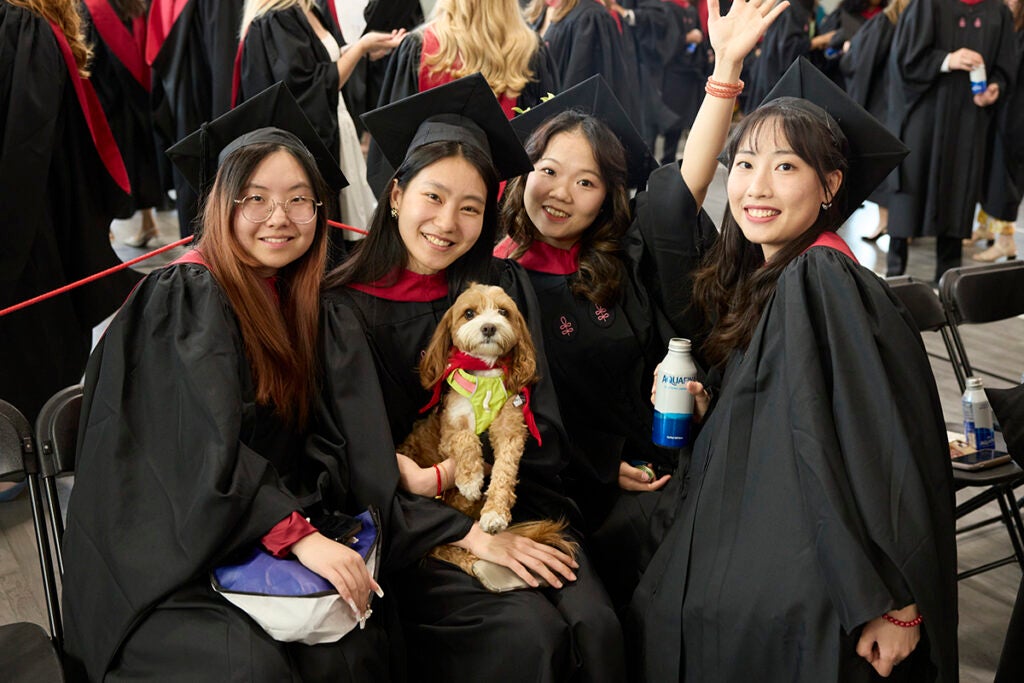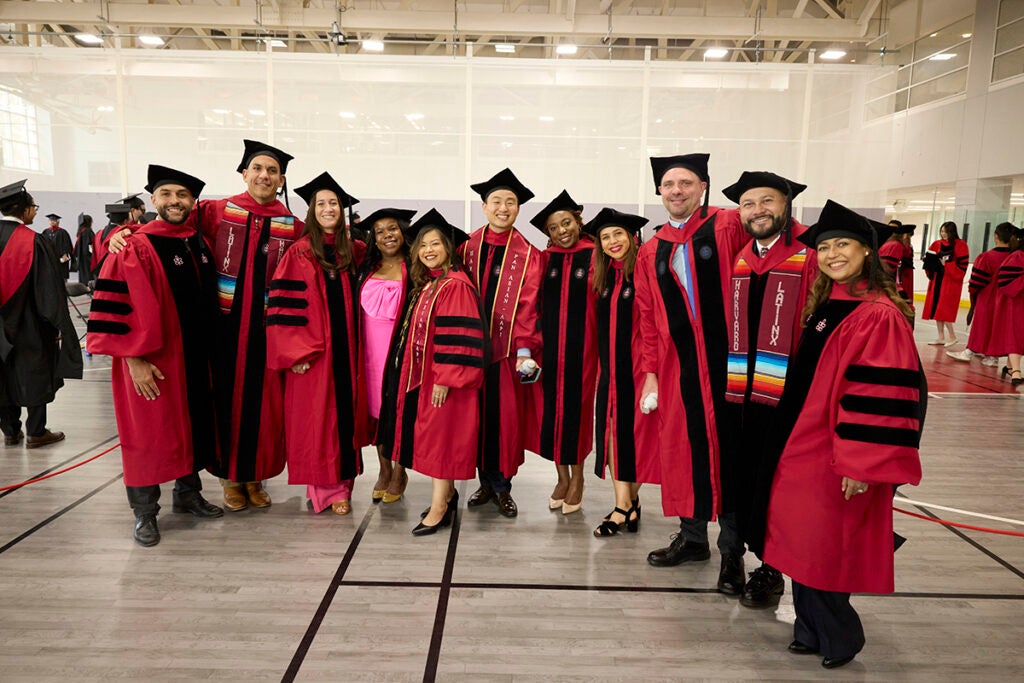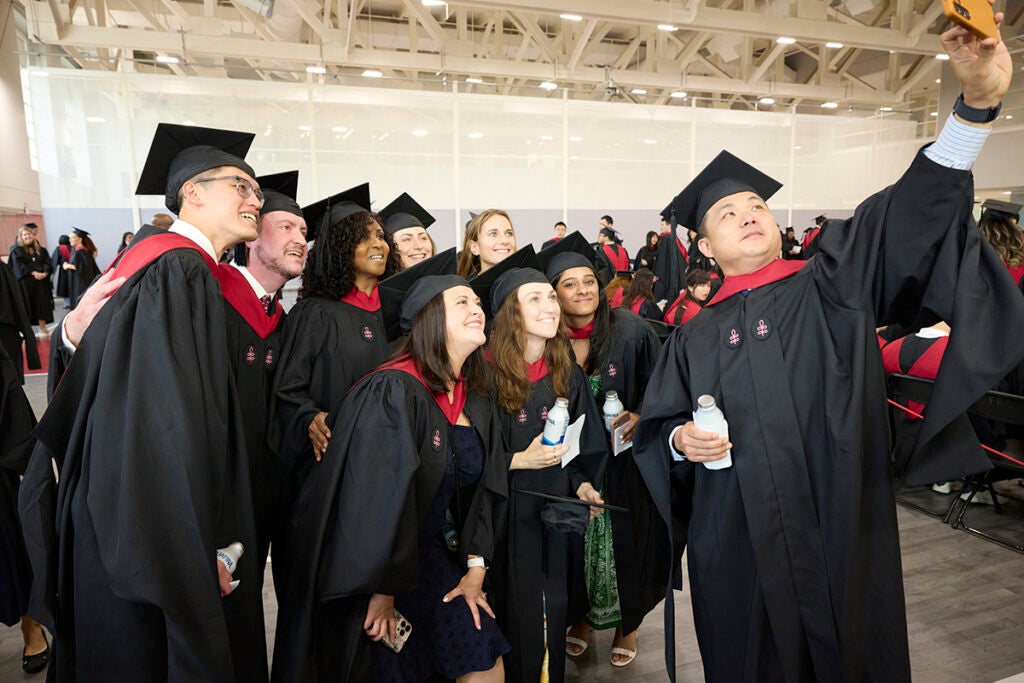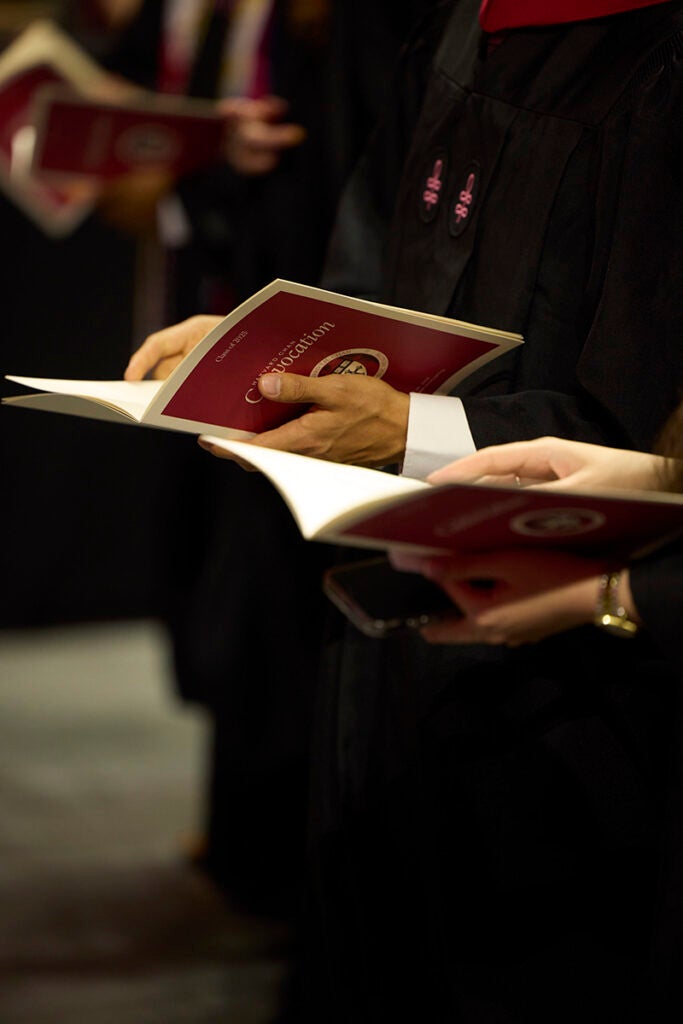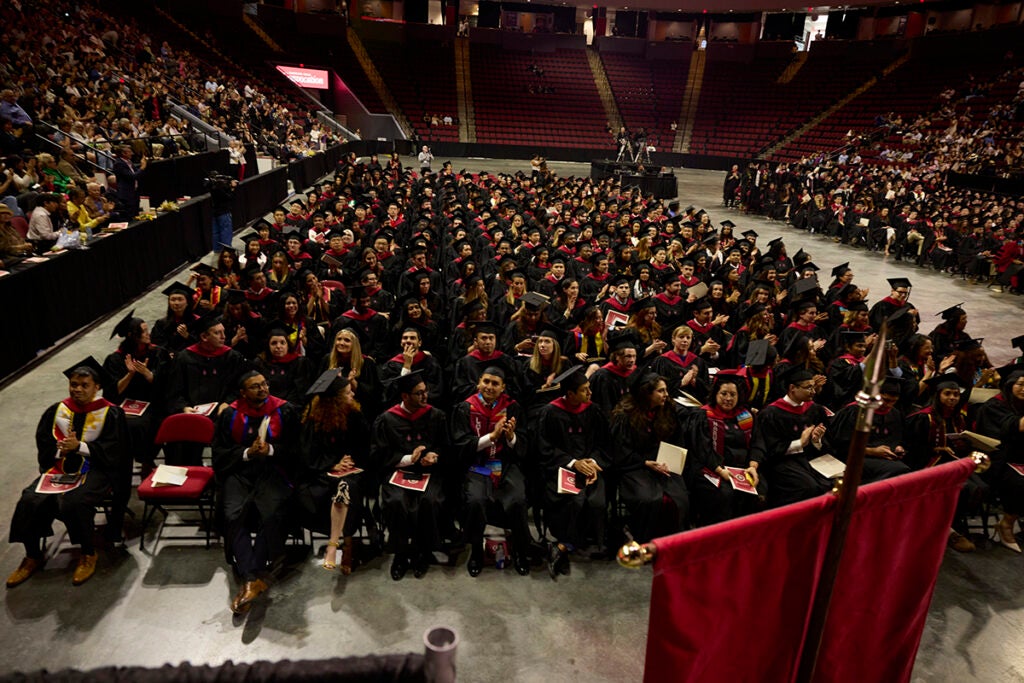‘Speak loudly, courageously, purposefully,’ Harvard Chan graduates told
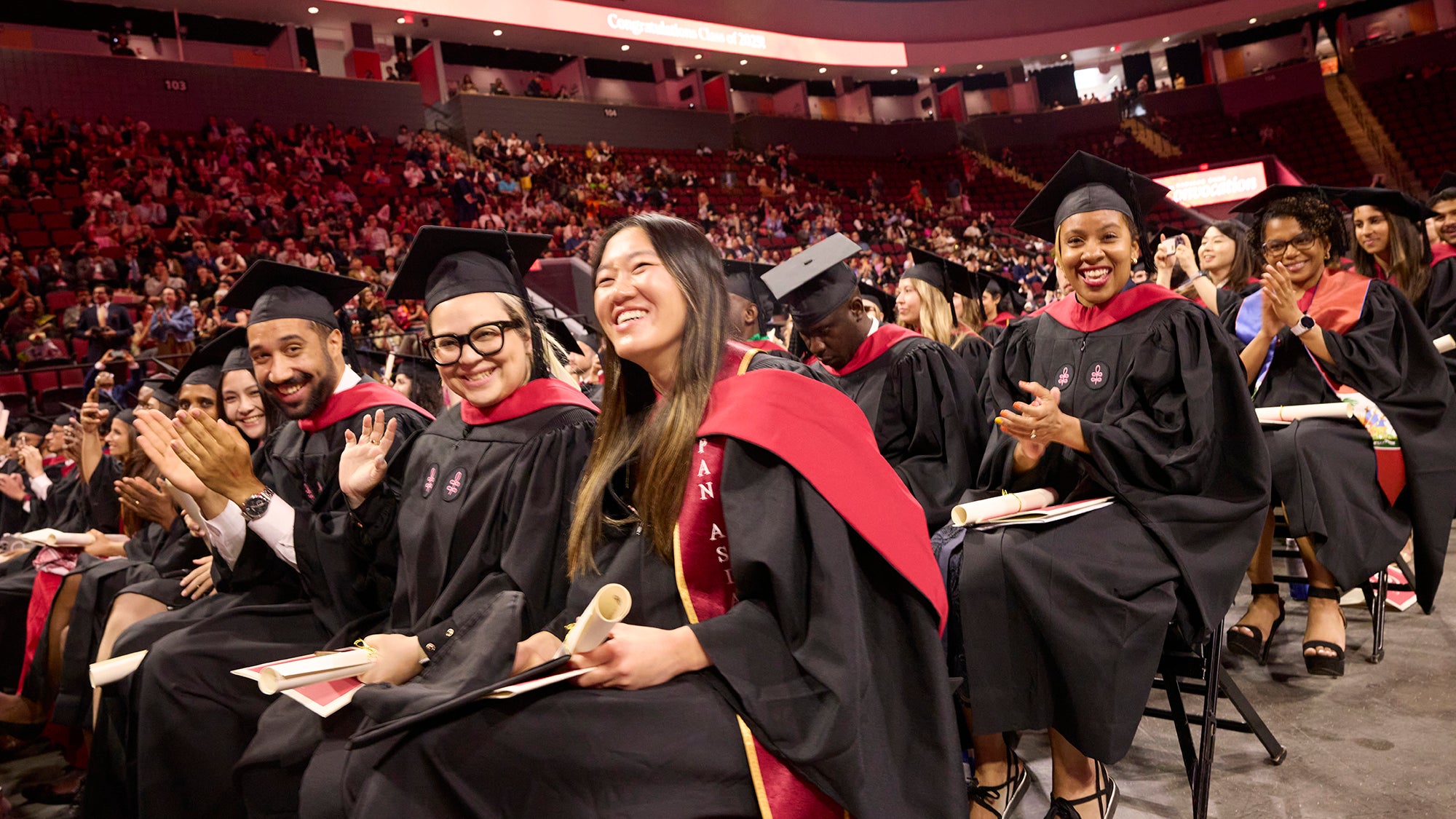
During a time of intense challenges facing public health, Celine Gounder called on graduating students at Harvard T.H. Chan School of Public Health to respond with resilience, courage, and faith.
Speaking at Harvard Chan School’s May 28 Convocation ceremony, Gounder—a clinical associate professor of medicine and infectious diseases at NYU Grossman School of Medicine, an editor-at-large for public health at KFF Health News, and a contributor to CBS News—said, “This is a difficult moment. For our profession. For our nation. For our world.” But, she added, “While none of us gets to choose the times into which we are born, we do get to choose how we meet that moment.”
The Convocation for the Class of 2025, held at Boston University’s Agganis Arena, celebrated the accomplishments of 615 graduates. Degrees, which will be officially granted at the Harvard Commencement ceremony on May 29, included doctor of philosophy (54), doctor of public health (14), master in health care management (18), master of public health (374), and master of science (155). The graduates came from 33 U.S. states and 52 different countries.
At a reception on May 27, awards were presented to graduating students, faculty, and staff members. Award recipients were recognized by Jane Kim, dean for academic affairs, during the Convocation ceremony.
Facing headwinds
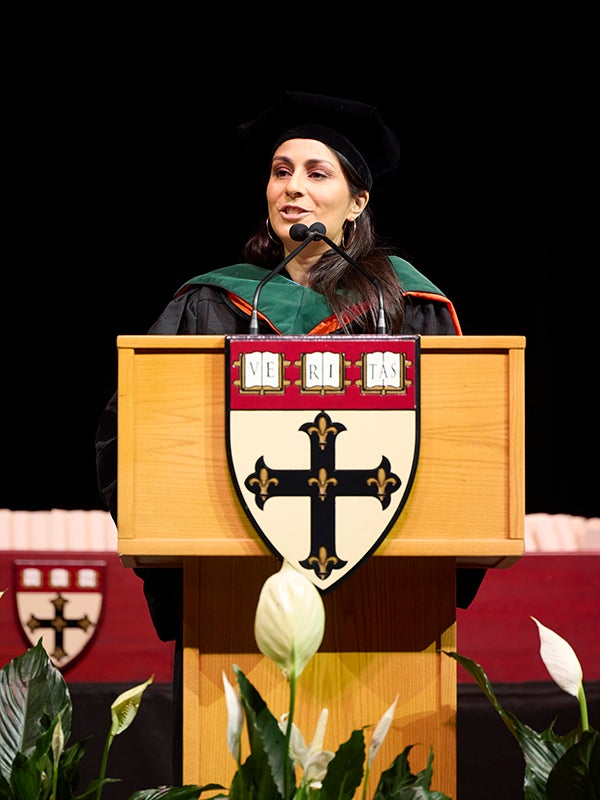
Gounder acknowledged the formidable headwinds currently facing public health. “Today, we see rising threats to the public health institutions that have kept our world safe for generations, cuts to research that benefits the lives of millions, looming public health emergencies that are not being addressed with the urgency they demand, and a continued, coordinated attack on the very idea of scientific progress,” she said.
She highlighted the crisis of mis- and disinformation, noting that social media is rife with false or misleading public health information, such as the notion that cell phone towers cause cancer or that the antiparasitic medication ivermectin can treat COVID. Trump administration moves—including directing federal employees to avoid using words like “bias” and “minority,” purging Centers for Disease Control and Prevention (CDC) data, and barring National Institutes of Health (NIH) researchers from traveling to HIV/AIDS conferences—are censoring scientific discourse, she said. Just yesterday, she noted, Health and Human Services Secretary Robert F. Kennedy, Jr. threatened to bar NIH scientists from publishing in the world’s leading medical journals “unless they conform to his ideology.” Instead, she said, “he wants to create government-run journals, further politicizing science and isolating American researchers from the global scientific community.”
Misinformation and disinformation about vaccines has been a particular problem, Gounder said. She pointed out that one in five Americans currently believe that vaccines—“one of the greatest triumphs of modern medicine”—are more dangerous than the diseases they prevent. “That includes, remarkably, the top official overseeing our nation’s health system: Secretary Kennedy,” she said. Recent actions by HHS agencies regarding vaccines may exacerbate the trend, she noted.
For example, the Food and Drug Administration’s [FDA] unilateral announcement that it will now require randomized, placebo-controlled trials for updated COVID vaccines for adults under age 65 with no known risk factors is “misguided on multiple fronts,” she said.
“First, science is built on consensus, not fiat. They will call this evidence-based and gold-standard. It is not,” she said. “Second, one in three Americans lacks a primary care provider—they may not even be aware of their risk factors. Third, many of us get vaccinated not just for ourselves, but also to protect others or because we can’t afford to take time off work. Fourth, such trials would be ethically fraught. And fifth, they’re logistically unworkable—too slow, too expensive.”
Gounder also criticized the CDC’s decision to drop its recommendation for COVID vaccination in healthy infants and healthy pregnant women. “Infants don’t usually die from COVID, but they’re still at elevated risk for ER visits and hospitalizations—both stressful and costly,” she said. “And pregnancy is a well-documented risk factor for severe COVID.”
As a result of the administration’s “Orwellian double-speak” on vaccines, people across the U.S. are choosing not to vaccinate, she said, making communities more vulnerable to preventable diseases such as polio, pertussis, influenza, and measles.
The current U.S. measles outbreak, which has resulted in more than 1,000 measles cases across 11 states—“a gross underestimate,” Gounder said—is a case in point. The disease carries serious risks such as hospitalization, death, and the risk of “measles immune amnesia,” in which measles damages the immune system and erases the body’s memory of how to fight off other infections. Gounder added that Secretary Kennedy—instead of encouraging vaccination—has instead suggested treating measles with cod liver oil, steroids, and antibiotics, “none of which prevent measles,” she said.
Gounder urged students to listen to people’s concerns about vaccines with care and interest. “I have found that, often, the solution to misinformation … is more compassion, more curiosity, more trust building,” she said.
Gounder also spoke about the “rapidly escalating assault” on public health institutions. She cited the U.S. withdrawal from the World Health Organization; the firing of thousands of workers at the CDC, the NIH, the FDA, and the U.S. Agency for International Development; the defunding and dismantling of programs that address smoking, nutrition, maternal health, mental health, and substance abuse; and the termination or freezing of billions in funding for public health and scientific research—including for universities like Harvard.
“And as you are all very aware, the administration is now trying to prevent Harvard from enrolling international students,” she said. She asked for a round of applause for all of the international students graduating—about 40% of the class—and the crowd responded with a standing ovation. Gounder credited the University for standing up to “these unprecedented attacks.”
Her advice to students was to speak out. “It’s critical to rebuild trust in public health,” she said. “Public health professionals can no longer afford the luxury of invisibility. You must explain to people what we do and why it matters. You must speak loudly, courageously, purposefully.”
Wise advice
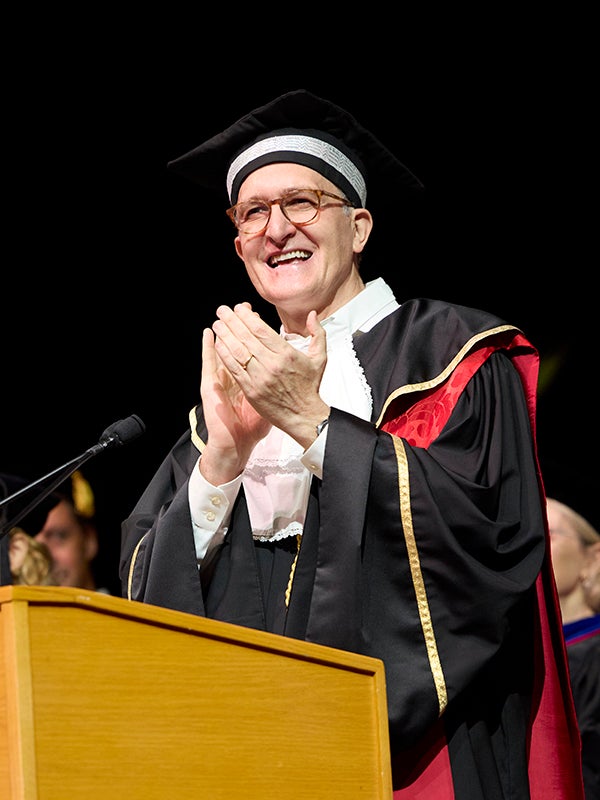
Harvard Chan School Dean Andrea Baccarelli also acknowledged the current challenges facing Harvard, public health, and the graduating students. “Our University and our field are being tested in ways few could have imagined,” he said.
Noting that “progress is always possible—even in the most difficult times,” he offered words of advice from several Harvard Chan School faculty members.
One piece of advice—from Joe Allen, director of the Healthy Buildings program, who studies the risks of environmental exposures in homes and offices—was to be agile to succeed in public health. He noted that Allen recently started a 10-year study to evaluate the impacts of the wildfires on health in Los Angeles. Allen relayed to Baccarelli that a friend had asked him why Harvard was sending faculty all the way to California. His answer: “Public health runs toward the problem. Never away from the problem.”
Baccarelli also cited advice from Shoba Ramanadhan, associate professor of behavior health, who works with community groups to use evidence-based interventions to address health inequities, and spends a lot of time talking with the groups about their experiences and expectations. Said Baccarelli, “She [Ramanadhan] tells me, you can not be successful in public health unless you open yourself to the world. You need to make yourselves accessible. Listen deeply. Learn from people whose experiences, perspectives, and skills are different from yours. And share your knowledge with humility.”
Meredith Rosenthal, professor of health economics and policy, shared, “Go out there with respect and compassion for everyone, especially those who are skeptical of public health.”
John Quackenbush, a professor of computational biology who works on cancer genomics, advised, “Being a leader doesn’t mean you always have to be right.” Instead, it’s important to be accountable. Said Baccarelli, “If you get something wrong, you fix it.”
And Smita Gopinath, an assistant professor who studies the human microbiome, said that when things get tough, she reminds herself why her work matters and how lucky she is to be doing it.
“I agree with Smita,” said Baccarelli. “Aren’t we so lucky to be in public health? We are lucky because our work is so important … because we are all positioned to make a difference.”
Navigating ‘treacherous skies’
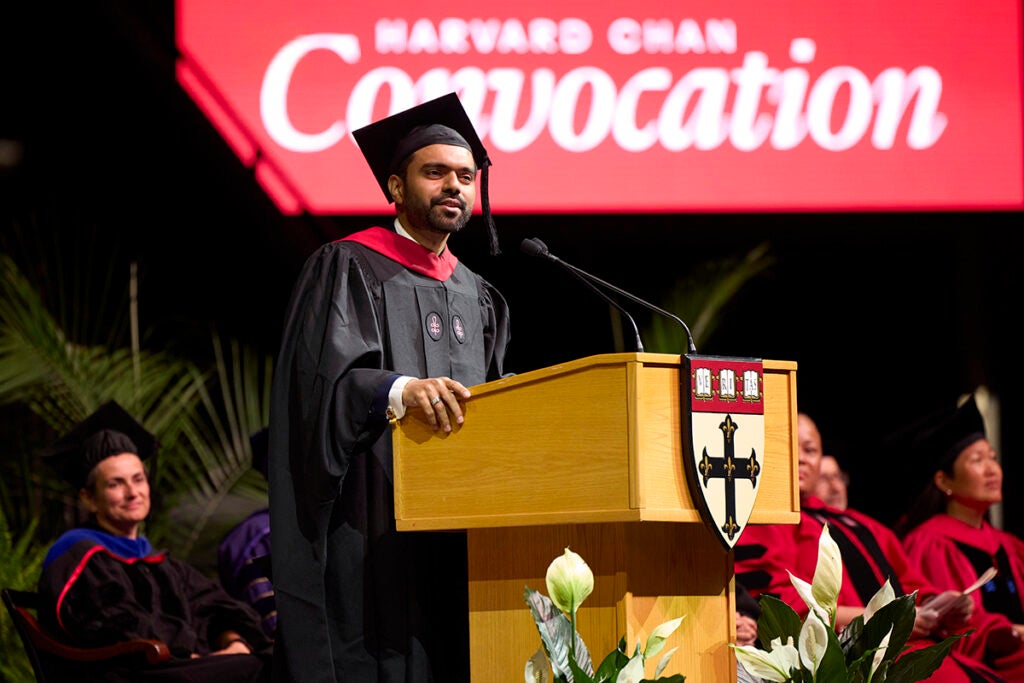
Muhammad Jawad Noon, MPH ’25, a physician, data scientist, and AI engineer, was the student speaker. He said that, as a young boy in Pakistan, he was obsessed with stars. One night his grandfather joined him to gaze up at the night sky, and said, “Jawad, there are two types of people: those who only see darkness, and those who map constellations to navigate home.” At the time, Noon said, he didn’t know which kind of person he was.
Years later, as a young medical doctor in Pakistan, he found himself caring for a young girl whose parents had just been killed in a terrorist bombing. He recalled the girl saying to him, “Doctor, will you help me find my way home?”
In that moment, “something inside me shattered,” Noon said. “Medicine could heal her wounds. What about the systems that failed her? My grandfather’s words thundered in my ears. I needed to map constellations to a better, healthier world. And that’s why I’m here.”
He continued, “Today, we navigate increasingly treacherous skies,” with universities’ autonomy to pursue truth under attack, funding for critical health institutions being slashed, innocent lives caught between politics and power around the world, and millions—like the young girl in Pakistan—increasingly vulnerable. “The stars by which we navigate seem dimmer than ever,” he acknowledged.
However, telling the graduates that they are “the most diverse, brilliant collection of minds I’ve ever encountered,” he urged them to remember his grandfather’s wisdom. “We are not the ones who see darkness, we are those who map constellations,” he said. “And when future generations ask, ‘Who helped us find our way home when the skies went dark?’ Let the answer be us.”
Meeting the moment
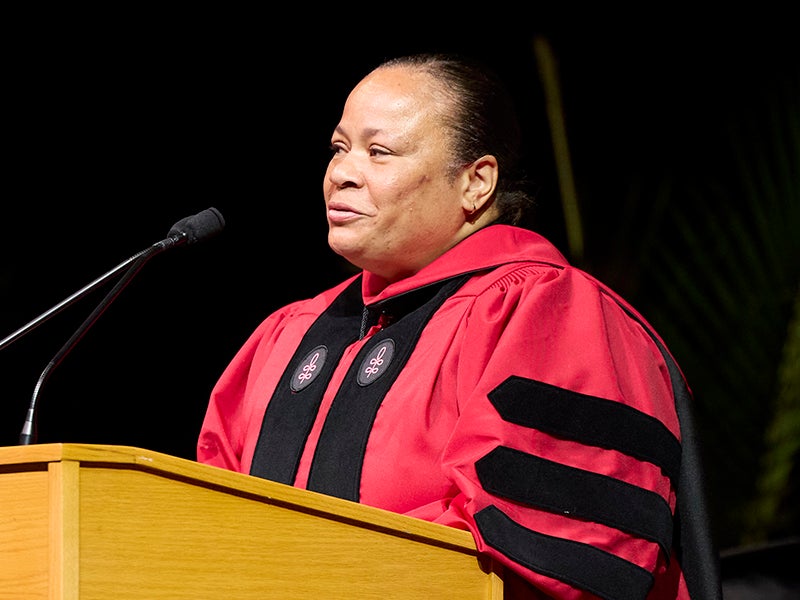
Jennifer Bishop, president of the Harvard Chan School Alumni Association, echoed themes raised by other speakers. “I know that the world you are stepping into may feel heavy and even hostile to the very values you have spent years studying and working to uphold,” she said. “But I do not want you to be afraid. I want you to be empowered.”
She acknowledged the challenges ahead, but said, “You are the ones who will meet this moment. … The world is counting on you—your brilliance, your courage, and your heart. We’re counting on you.”
Photos by Kent Dayton
